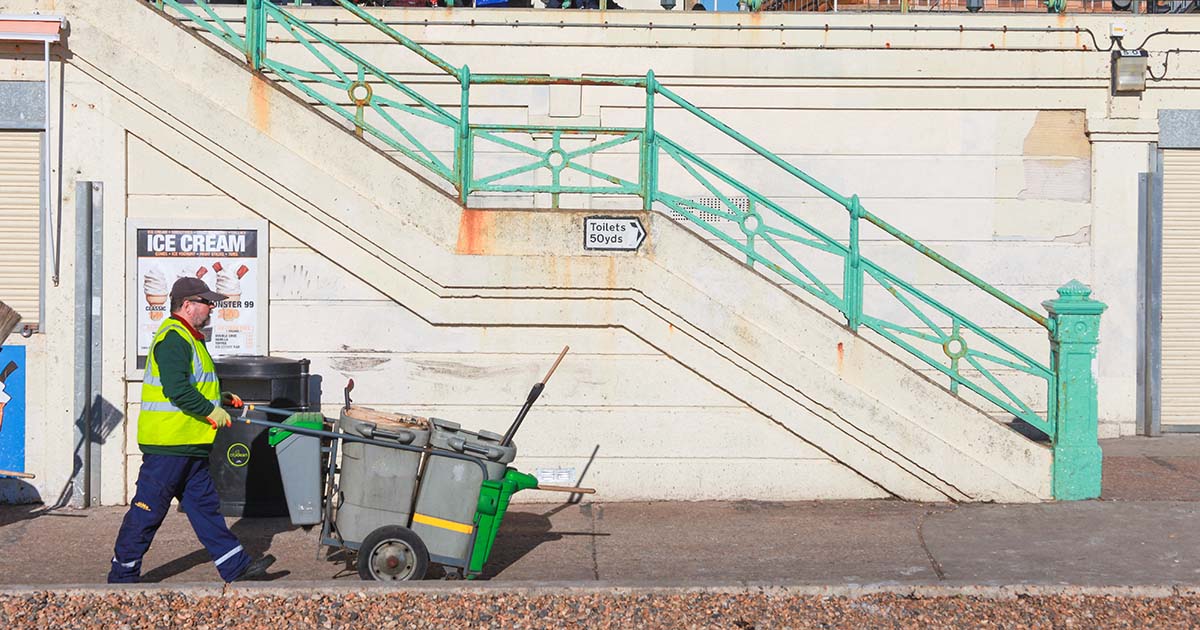Brighton Landfill Waste and Recycling Statistics 2025

Brighton is renowned for being a green city. It was home to the UK’s first Green MP, was the first UK location to be awarded the prestigious Gold Sustainable Food Place Award, and has pledged to become carbon-neutral by 2030.
But how do Brighton’s recycling statistics compare to the rest of the country?
In this article, we break down the latest waste statistics in Brighton to explore whether the city’s landfill and recycling efforts live up to its environmentally friendly reputation.
How much waste does Brighton produce?
Based on the latest government data for the year ending in March 2024, we found that:
- Brighton & Hove City Council collected 111,049 tonnes of waste that year. That’s equivalent to the weight of 222,098 cows!
- Compared to the year ending in March 2023, there has been a 2% increase in the amount of waste generated.
- Households generated 93% of the waste (103,586 tonnes).
- This works out to 367kg of household waste per person, including both recyclables and non-recyclables.
- On average, each household generated 556kg of black bin waste.
- The remaining 7% of waste (7,462 tonnes) comes from businesses, factories, litter bins and fly-tipping.
- To put this into perspective, Medway Borough Council (117,686 tonnes) and Milton Keynes Council (121,339 tonnes) produced similar amounts of waste in the last year.
Brighton recycling statistics: How does it compare regionally and nationally?
In the year ending March 2024, Brighton & Hove City Council recycled 31,400 tonnes of waste. This means that just under a third (28%) of the total waste collected avoided landfill or incineration through recycling or reuse.
So, how does this compare to other local authorities in the South East and across England?
- Of 70 local authorities in the South East, Brighton placed 65th in the region for their recycling rate.
- Kent County Council leads the region with a recycling rate of 40%, while Slough Borough Council has the lowest at 23%.
- Nationally, Brighton ranks 282nd out of 321 local authorities for its recycling rate, placing it in the bottom 12%.
- Brighton’s household waste recycling rate of 4% is also below the national average of 44%.
The table below shows the 10 local authorities in the South East with the lowest recycling rates in the year ending March 2024:
| Rank | Local Authority | Percentage of Waste Recycled |
|---|---|---|
| 1. | Slough Borough Council | 23% |
| 2. | Dartford Borough Council | 24% |
| 3. | Gosport Borough Council | 26% |
| 4. | Southampton City Council | 27% |
| 5. | Portsmouth City Council | 28% |
| 6. | Brighton and Hove Council | 28% |
| 7. | Hastings Borough Council | 30% |
| 8. | Basingstoke and Deane Borough Council | 30% |
| 9. | Havant Borough Council | 31% |
| 10. | Crawley Borough Council | 31% |
How does Brighton’s recycling rate compare year-on-year?
- Over the past decade, Brighton’s recycling rate has fluctuated slightly but remained relatively low overall.
- In the year ending March 2022, Brighton recorded a 10-year recycling rate of 30% but it has since declined year-on-year.
Brighton landfill waste statistics: How much of Brighton’s rubbish is sent to landfill?
Brighton may have progress to make with recycling, but how much of its waste ends up in landfills? Here’s what recent data reveals:
- In the year ending March 2024, Brighton and Hove City Council reported that only 1% of waste (132 tonnes) collected was sent to landfill.
- In comparison, 71% of total waste (79,383 tonnes) was incinerated to generate energy.
- This makes Brighton one of the cities in the country that sends the least amount of waste to landfills.
- To put this into perspective, Plymouth City Council sent just 117 tonnes of waste to landfill in the same year.
- 2% of the waste (2,385 tonnes) incinerated or landfilled was contaminated material, likely rejected from recycling, reuse, or composting.
Looking to the future
In January 2025, Brighton & Hove City Council announced a major expansion of its recycling services to boost its recycling efforts. From May 2025, residents will be able to add more materials to their kerbside recycling bin and communal mixed recycling collections.
The newly accepted materials include:
- Plastic pots, tubs and trays – such as yoghurt pots, fruit punnets, margarine tubs, and soup containers.
- Food and drink cartons – including Tetra Paks (e.g. fruit juice and plant-based milk), gravy tubs, crisp tubes, kids’ drink cartons, and soup cartons.
- Aluminium foil and foil trays
This push to bolster recycling efforts is driven by new government regulations under the Simpler Recycling scheme, introduced in 2024. Over the next several years, this scheme will require all local authorities to improve recycling rates for both household and non-household waste.
Brighton & Hove is also working toward the government's Circular Economy Package target of achieving a 65% recycling rate by 2035.
In addition, the council is investing £1.2 million this year in a new food waste collection service. Once collected, the city’s food waste will be sent to a composting facility.
With over 10 million tonnes of food wasted annually across the UK — and more than a third of Brighton’s household rubbish made up of food and drink waste — this marks a significant step towards reducing landfill use and improving sustainability across the city.
What can residents do to support Brighton & Hove City Council’s recycling and waste reduction goals?
Residents play a vital role in boosting Brighton’s recycling rates and cutting down on household waste. With the council’s newly expanded recycling service, residents can now recycle a wider range of materials than ever before.
For larger or complex waste disposal, such as commercial waste or bulky household items, professional services like HIPPO can help. HIPPO offers sustainable and hassle-free rubbish removal in Brighton, ensuring that your trash is dealt with responsibly and efficiently. From garden waste clearances to general household waste pick-ups, we offer various services across the city to suit your needs, all easily accessible locally.
By making smart waste choices, Brighton residents can help reduce landfill waste, improve recycling rates, and build a greener city for the future.

